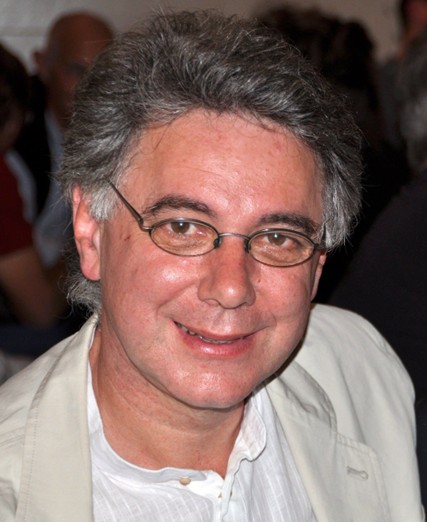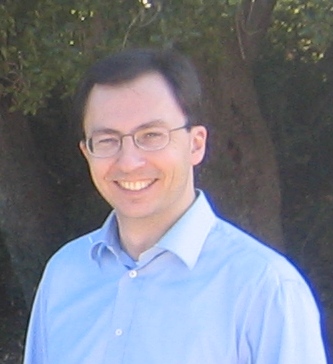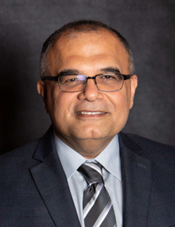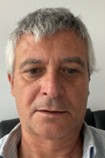PROGRAM
Plenary lectures
ROCOND’25 features the following plenary speakers :
- António Pascoal, Instituto Superior Técnico (PT)
- Marco Lovera, Politecnico di Milano (IT)
- Reza Moheimani, University of Texas at Dallas (USA)
- Valentina Breschi, Eindhoven University of Technology (NL)
- Ramon Costa Castelló, Universitat Politècnica de Catalunya (SP)
More details about the dates and contents of the plenary lectures will be provided soon.

António Pascoal
Laboratory of Robotics and Engineering Systems (LARSyS),
Institute for Systems and Robotics (ISR) / Instituto Superior Técnico (IST),
University of Lisbon, Portugal
Title : United they Stand: the Beauty and Power of Cooperative Marine Robotic Systems
Abstract :The last decade has witnessed tremendous progress in the development of marine technologies that are steadily affording scientists advanced equipment and methods for ocean exploration and exploitation. Recent advances in marine robotics, sensors, computers, communications, and information systems are being applied to the development of sophisticated technologies that will lead to safer, faster, and far more efficient ways of exploring the ocean frontier, especially in hazardous conditions. As part of this trend, there has been a surge of interest worldwide in the development of autonomous marine vehicles (AMVs) capable of roaming the oceans freely and collecting data at the surface of the ocean and underwater on unprecedented scales. Representative examples of AMVs include autonomous surface craft (ASC), autonomous underwater vehicles (AUVs), and underwater Gliders. The mission scenarios envisioned call for the operation of the latter acting in cooperation to execute challenging tasks without close supervision of human operators.
This talk is rooted in the general topic of cooperative motion planning, navigation, and control of marine vehicles, both from a theoretical and a practical perspective. The presentation builds upon practical developments and experiments. Examples of scientific missions with ASCs, AUVs, and Gliders acting in cooperation, set the stage for the main contents of the presentation, which is strongly motivated by a number of challenging and timely problems that arise in the development and operation of autonomous vehicles for scientific ocean studies, habitat mapping in complex 3D scenarios, geotechnical surveying, ocean radioactivity mapping, and localization and tracking of marine megafauna. From a theoretical standpoint, illustrative problems are introduced in the general area of networked systems subjected to stringent communication constraints. Namely, i) cooperative motion control, ii) cooperative navigation, and iii) range /bearings-based multiple target localization and tracking. Some of the results obtained are documented with videos from actual field tests with multiple marine robots exchanging information over acoustic and optical networks.
The core materials presented in this talk were obtained in the scope of the following EU-funded projects:
- MORPH (https://cordis.europa.eu/project/rcn/101726/factsheet/en)
- WiMUST (http://www.wimust.eu/)
- H2020 EU Marine Robotics Research Infrastructure Network (https://www.eumarinerobots.eu/)
- RAMONES (https://ramones-project.eu/)
- BlueRoses ( https://bluerosesproject.wixsite.com/home)
Bio : PhD in Control Science from the University of Minnesota, Minneapolis, MN, USA, 1987. Associate Professor of Control and Robotics at IST, University of Lisbon, Portugal. Member, Scientific Council of the Institute for Systems and Robotics (ISR). Founder, Dynamical Systems and Ocean Robotics Lab (DSORLab) of ISR. Coordinator, Thematic Area “Technologies for Ocean Exploration and Exploitation” of the Associate Laboratory of Robotics and Engineering Systems (LARSyS). He has been an Adjunct Scientist, National Institute of Oceanography (NIO), Goa, India and a Visiting Faculty, Department of Ocean Engineering, IIT Madras, Chennai and Birla Institute of Technology Science, Pilani (BITS Pilani), Goa, under the Indian Sparc Programme. Expertise in Dynamical Systems Theory, Marine Robotics, Navigation, Guidance, and Control of Autonomous Vehicles, and Networked Control and Estimation with applications to air and underwater robots. His long-term goal is to contribute to the development of advanced robotic systems for ocean resources exploration and exploitation.
He has coordinated and participated in a large number of international projects that have led to the design, development, and field-testing of single and multiple autonomous marine and air vehicles and systems in cooperation with partners in India (National Institute of Oceanography, Goa), USA (Naval Postgraduate School, Monterey, CA), Korea (KAIST, Daejeon), and various countries in Europe. Director, FCT PhD program on Networked Interactive Cyber Physical Systems (NETSyS) and Member, Editorial Board of the Springer Intelligent Systems, Control and Automation Book Series, and Elected Chair, IFAC Technical Committee Marine Systems, from 2008-2014. Member, International Program Committees of numerous conferences on dynamical systems and control as well as marine and aerial robotics. He has published a total of 113 books, book chapters, and peer reviewed journal papers and 300 conference papers (14936 Citations, h-index 64, i10-index 279 / Google Scholar). He is a co-author of the monograph Time-Critical Cooperative Control of Autonomous Air Vehicles, authors I. Kaminer; A. Pascoal, E. Xargay, N. Hovakimyan, V. Cichella, and V. Dobrokhodov, Elsevier B. Heinemann, August 2017. He received the IEEE OES AUV Distinguished Lifetime Technical Achievement Award in 2020.

Marco Lovera
Politecnico di Milano (IT)
Title : Model identification for aerospace systems: methods, tools and results
Abstract : Accurate model identification is essential for developing robust control strategies for aerospace systems. This talk presents the identification of Linear Time-Invariant (LTI) and Linear Time-Periodic (LTP) models, along with Linear Parameter-Varying (LPV) modeling, for aerospace systems, with a focus on small-scale and full-scale rotorcraft.
We discuss continuous-time subspace identification using Laguerre and Hermite bases, enhanced by Bayesian optimization for hyperparameter tuning and model structuring, and introduce virtual reference predictor-based control for data-driven design.
Experimental results on multirotor systems demonstrate the effectiveness of these techniques for LTI and LTP model identification and data-driven control. A case study on helicopter model identification is also presented, covering the complete process of LTI model identification, as well as LPV modeling.
This presentation underscores strong synergies between education and research and joint work with collaborators from academia and industry.
Bio : Marco Lovera is a Full Professor of Automatic Control at the Department of Aerospace Science and Technology of Politecnico di Milano. He received his Ph.D. in Systems and Control Engineering from Politecnico di Milano in 1998. His research focuses on modeling, identification, and control of aerospace systems, including spacecraft attitude dynamics, rotorcraft, and small autonomous vehicles. He has authored over 200 scientific publications and has been involved in numerous national and international research projects. Professor Lovera is also active in the IEEE and IFAC communities, having served as Associate Editor for Automatica and Senior Editor for the IEEE Transactions on Control Systems Technology.

Reza Moheimani,
University of Texas at Dallas (USA)
Title : From Imaging to Lithography: Control-Enabled Advancements in Scanning Tunneling Microscopy
Abstract : The scanning tunneling microscope (STM), a Nobel Prize-winning invention, has revolutionized surface science with its ability to image and manipulate matter at the atomic scale. While STM has traditionally been used for topographic imaging and spectroscopy, recent advances have expanded its applications to include atomically precise lithography, crucial for the development of future quantum electronic devices. Despite these advancements, the fundamental feedback control loop that governs STM operation has remained largely unchanged for the past 40 years. This presentation delves into the intricate interplay between STM feedback control and surface physics, exploring how innovative modifications to the control system can unlock new modes of imaging, spectroscopy, and lithography. Reimagining the STM’s control system is the key to pushing the boundaries of STM capabilities and opening new frontiers in nanoscale science and engineering.
Bio : Reza Moheimani is a Professor and James Von Ehr Distinguished Chair in Science and Technology in the Department of Systems Engineering at the University of Texas at Dallas with affiliate appointments in Electrical and Computer Engineering and Mechanical Engineering Departments. He is the past Editor-in-Chief of Mechatronics, and a past associate editor of IEEE Transactions on Control Systems Technology, IEEE Transactions on Mechatronics and Control Engineering Practice. He received the Industrial Achievement Award (IFAC, 2023), Nyquist Lecture Award (ASME DSCD, 2022), Charles Stark Draper Innovative Practice Award (ASME DSCD, 2020), Nathaniel B. Nichols Medal (IFAC, 2014), IEEE Control Systems Technology Award (IEEE CSS, 2009) and IEEE Transactions on Control Systems Technology Outstanding Paper Award (IEEE CSS, 2007 and 2018). He is a Fellow of IEEE, IFAC, ASME and Institute of Physics (UK). Moheimani received the Ph.D. degree in Electrical Engineering from University of New South Wales, Australia in 1996. His current research interests include applications of control and estimation in high-precision mechatronic systems, high-speed scanning probe microscopy and advanced atomically precise manufacturing.

Valentina Breschi,
TU (NL)
Title : To model or not to model, is that the question?
Abstract : Data-driven control is getting the spotlight, promising to enable control design directly from raw data while avoiding what is arguably the most time-consuming phase of the control design pipeline, modeling. Comparing and contrasting existing approaches for data-driven predictive control with a focus on LPV systems, this talk will accompany the audience on a journey toward recent advances in the field, unveiling the role of modeling assumptions and key connections with system identification.
Bio : Valentina Breschi received her B.Sc. in Electronic and Telecommunication Engineering and her M.Sc. in Electrical and Automation Engineering from the University of Florence (Italy) in 2011 and 2014, respectively. She received her Ph.D. in Control Systems from IMT School for Advanced Studies Lucca (Italy) in 2018, being a visiting scholar at the University of Michigan (USA). From 2018 to 2023, she was with Politecnico di Milano (Italy), first as a post-doctoral researcher and then as a junior assistant professor from 2020 to 2023. In 2023, she joined the Department of Electrical Engineering at Eindhoven University of Technology (The Netherlands) as an Assistant Professor. Her main research interests include data-driven control, system identification, collaborative learning, and fairness in decision-making.

Ramon Costa Castelló,
Universitat Politècnica de Catalunya (SP)
Title : Estimation in electrochemical energy systems
Abstract : In the current context of climate change and a revolution in the energy system, electrochemical energy systems are gaining significant relevance. These systems include hydrogen systems, lithium-ion batteries, and redox flow batteries, among others. These types of systems exhibit nonlinear dynamics with a large number of variables that are difficult to measure but contain key information for effective energy management.
During the talk, various case studies will be presented, along with the analysis conducted to address the problem and proposed solutions. In addition to conceptual developments, some experimental results and current issues will be discussed.
Bio : Ramon Costa-Castelló was born in Lleida (Catalunya, Spain) in 1970. He obtained a degree in computer science in 1993 at the Facultat d’Informàtica de Barcelona (FIB) from Universitat Politècnica de Catalunya (UPC), in 2001 I got the doctorate in the Advanced Automation and Robotics (AAR) program at Institut de Cibernètica (UPC).
Since September 2023, he is a Full Professor at the ESAII (Enginyeria de Sistemes, Automàtica, i Informàtica Industrial) department from UPC.
His teaching activity is linked to Escola Tècnica Superior d’Enginyeria Industrial de Barcelona (ETSEIB) and currently to the master’s degree in industrial engineering (MUEI) and the master’s degree in Automation and Robotics (MUAR).
His research focuses on the development of digital control techniques for monitoring/rejecting periodic signals (repetitive control and resonant control), the development of techniques for state and parameter estimation, and its application to energy management systems. Recently focused on the modelling and control of electrochemical energy storage systems (hydrogen, redox flux batteries). As a result of this research, he has participated in a good number of regional, national and European projects.
The results of his research have been published in 107 JCR journal publications (Q1:53, Q2: 24, Q3:21, Q4: 9). H-index (Scholar Google: 35, ResearchGate: 30, Scopus: 27, WOS: 24).
The webpage https://ramon-costa.staff.upc.edu contains detailed information on these publications.
He regularly collaborates with different scientific organizations: he is a Senior Member of the IEEE.
Since 1998, he is an active member of the Spanish Automation Committee (CEA), and its thematic groups in Control Engineering and Automatic Education. From 09/2016 to 9/2024. He has been the secretary of the association and a member of the CEA Directive Board.
Additionally, He is an IFAC (International Federation of Automatic Control) affiliate member, especially active in 2 technical committees of the (TC 7.1 on “Automotive Control” and TC 9.4 on “Control Education”).
He serves as reviewer in various prestigious international journals and conferences, and research agencies as AEI and ANECA.
Proceedings
The proceedings can be found at this link (you will be redirected to a new password-protected webpage).
Young paper prize finalists – ROCOND 2025/LPVS 2025
We are pleased to announce the finalists for the ROCOND 2025 Young Author Paper Prize. This award recognizes outstanding contributions from early-career researchers. The winner will be announced during the closing ceremony.
| Student Name | Paper Title |
| Folco Giorgetti | Robust Aperiodic Sampled-Data Washout Control for Uncertain Affine Systems |
| Edgar Javier Olucha Delgado | Automated Linear Parameter-Varying Modeling of Nonlinear Systems: A Global Embedding Approach |
| Maxime Boulanger | Linear Parameter-Varying Observer for Online Tire Grip Potential Estimation |
| Hibiki Gyotoku | Detecting Destabilizing Nonlinearities in Absolute Stability Analysis of Discrete-Time Feedback Systems |
| Ram Padmanabhan | Energetic Resilience of Linear Driftless Systems |
Social Program
Welcome Reception
We warmly invite all participants to join us for the ROCOND 2025 / LPVS 2025 Welcome Reception, which will take place on July 2, 2025, from 19:00 to 21:30, in the main courtyard of the Colégio de Nossa Senhora de Lourdes.
This special evening will begin with a surprise moment, followed by a buffet dinner featuring a selection of local delicacies and refreshments. It will be a wonderful opportunity to enjoy the historic courtyard atmosphere of the”colégio”, connect with fellow attendees, and kick off the conference in a relaxed and informal setting.
We look forward to welcoming you!
Conference Dinner at WOW – A Unique Cultural & Gastronomic Experience
We are delighted to invite all participants to the official ROCOND/LPVS 2025 Conference Dinner, which will take place on Thursday, 3rd July, at the elegant VP Restaurant located in the heart of WOW – World of Wine, in Vila Nova de Gaia.
The evening will begin with a guided visit to one of two museums within the WOW cultural district:
- Porto Region Across The Ages: an immersive journey through 1,000 years of Porto’s history.
- The Wine Experience: a vibrant exploration of Portugal’s wine culture, ending with a guided tasting of red, white, and port wine.
After the visit, we will enjoy a classical Guitar concert by our colleague Sérgio Reis Cunha, followed by a welcome drink on the panoramic terraces of the VP restaurant, with breathtaking views over Porto.
After, dinner will be served.
Dinner guests are asked to choose the main course in advance from the following options (please follow the hyperlink below):
- Cod fish (bacalhau) with cornbread & black olive crust
Smashed “batata a murro” potatoes | sautéed turnip greens in olive oil & garlic
(Bacalhau is one of the most iconic and beloved dishes in traditional Portuguese cuisine) - Spoon-tender veal
Truffled mashed potatoes | rustic vegetables | red-wine jus - Vegetarian option
For participants with full registration, dinner is included. For accompanying persons and participants with student registration, the extra cost is €95 per person (guided visit to one of two museums within the WOW cultural district included).
To help us plan this special evening, we kindly ask all attendees to fill out the Dinner Registration Form.
Please note that registration will close on Sunday, 23rd June, as we need to inform WOW of the final number of participants shortly thereafter.
Participants with full registration who, at the time of registration, indicated that they would attend the dinner and are not bringing any accompanying persons do not need to fill out the form. In such cases, we will assume cod fish as the default choice for the main course.
We are looking forward to sharing this memorable evening with you! See you in Porto.
Closing Ceremony & Porto de Honra
The Closing Ceremony of ROCOND 2025 / LPVS 2025 will take place on July 4, 2025, from 16:00 to 17:00, in the main courtyard of the Colégio de Nossa Senhora de Lourdes.
To mark the conclusion of the conference, we invite all participants to a Porto de Honra — a traditional Portuguese reception featuring a toast with Port wine. Symbolizing gratitude and celebration, the Porto de Honra offers a final opportunity for networking and informal exchange among participants.
During the ceremony, we will also announce and present the Young Author Prize, recognizing an outstanding contribution from a student or early-career researcher.
We hope you’ll join us to celebrate the closing of the event in true Porto style!
Discover Porto on foot
Guided Historical Tours with an Archaeologist
As part of the ROCOND/LPVS 2025 social programme, we are delighted to offer participants the chance to discover Porto through the eyes of a professional archaeologist. Dr. Gustavo Portocarrero, PhD in Archaeology and expert in the city’s history and heritage, will lead two exclusive walking tours specially curated for our conference attendees.
Each tour offers an immersive journey through Porto’s urban landscape, architectural treasures, and hidden corners — revealing the soul of one of Europe’s most captivating historic cities.
Tour 1 – From Gardens to the Douro: A Journey Through Time
- Date & Time: July 3 at 16:30 (ends just before the visit to the WOW museum)
- Start: Colégio Nossa Senhora de Lourdes
- End: WOW Cultural District, Vila Nova de Gaia
- Duration: ~2 hours
- Includes: Medieval alleys, historic gardens, riverside paths, and the Port wine legacy
- Limit: Maximum 20 participants
Highlights:
- Palácio de Cristal Gardens
- Parque das Virtudes
- Ribeira riverside quarter
- Walk across the lower deck of the iconic Luís I Bridge
- Port wine cellars
- Final stop at WOW – the World of Wine experience zone
Tour 2 – Monumental Porto: Buildings, Tiles, and Hidden Gems
- Date & Time: July 4 at 17:30
- Start: Colégio Nossa Senhora de Lourdes
- End: Bolhão Market
- Duration: ~2 hours
- Includes: Architectural landmarks, panoramic views, and the Bourgeois spirit of Porto
- Limit: Maximum 20 participants
Highlights:
- Façades decorated with traditional tiles
- Clérigos Tower
- Lello Bookstore
- Porto Cathedral
- Historic cafés and boutiques
- Final stop at Bolhão Market – the city’s main traditional market
Why Join?
- Expertly guided by a PhD archaeologist with deep knowledge of Porto’s past
- Perfect for history lovers, curious minds, and those who want to go beyond the usual tourist experience
- A memorable way to connect with fellow conference participants while exploring the authentic Porto
Register here
- Participation is free of charge.
- You may also sign up for the tours in the conference websites
Please note:
- Each tour is limited to 20 participants.
- To ensure fairness, each participant may register for only one of the two tours.
Practical tip: Wear comfortable shoes — Porto’s charm comes with cobbled streets and hills!
